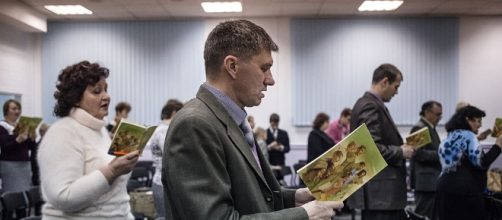In a decision handed down on Thursday, April 20, Russia’s Supreme Court ruled to uphold the Russian Ministry Of Justice and its assertion that Jehovah’s Witnesses represent an “extremist” organization. The decision has both legal ramifications to the holdings of Jehovah’s Witnesses in Russia, as well as implications to the nearly 200,000 individual members of the organization.
Ruling states property can be liquidated
Under the ruling, the land, buildings and other assets of the 395 local chapters of the Witnesses in Russia are now considered state property, and can be seized and sold by the Russian government.
Individual members of the organization are now open to potential criminal prosecution for engaging in door-to-door preaching, for possessing so-called “extremist” literature, or for informally sharing their Bible-based beliefs with passersby.
Witnesses vow to appeal
According to Russian News Agency TASS, the Witnesses had already said that if the decision was not in their favor, they would exercise their right to appeal to the appellate panel of Supreme Court, and if necessary, to the European Court of Human Rights, which has consistently upheld the rights of Jehovah’s Witnesses throughout most of Europe. Today’s ruling will take effect after the appellate court makes its decision, or within 30 days of the now-closed trial.
The six-day hearing has been closely followed by the over eight million Jehovah’s Witnesses around the world. The Witnesses actively preach in nearly 250 different lands and countries, and for the most part, their peaceful attempts to bring “good news” to their neighbors is respected and upheld under the individual's rights and freedoms in those respective countries.
Russia's Federal Law on Extremism
In Russia however, the broad scope of the Federal Law on Extremist Activity netted Jehovah’s Witnesses. The law looks to identify and eliminate subversive actions of individuals belonging to radicalized clusters, such as terrorist cells and other organizations posing domestic threats. Yet Jehovah’s Witnesses, known around the world as peaceful, law-abiding and productive citizens, have been targeted.
Even the illustrated children’s publication My Book of Bible Stories – a colorful book of simple stories about the Garden of Eden, Noah, Moses and others – had been placed on the state’s list of banned materials.
Biased testimony
Justice Ministry attorney Svetlana Borisova commented after the ruling that the Witnesses “pose a threat to the rights of the citizens, public order and public security.” Last week, the court heard from individuals who were once members of the Jehovah’s Witnesses faith. Those members painted a negative picture of the organization; the Witnesses responded by pointing out that those called to testify were individuals actively working against the organization, making their testimony both subjective and biased.
Court prevents Witnesses from showing critical evidence
The court also did not allow the Witnesses to present video evidence showing Russian police and other officials invading their Kingdom Halls – their places of worship – and planting the so-called extremist publications. The Witnesses also were prevented from fully revealing to the court the extent of the ongoing persecution the organization has been enduring in Russia since 2010 – including police raids, illegal entries and assaults on individual members, even arson attacks by police officials on their homes and Kingdom Halls.
What the ban would mean
Even if the ban is enacted, that will not stop the Witnesses from carrying on what they see is their God-given commission to preach.
As the Russians learned in the days of World War II and the Soviet Union, sending the Witnesses away to concentration camps only saw members make disciples within the barbed-wired barracks. When their places of worship were boarded up, they met under the cover of night in homes and secret locations. When the Bible and literature was banned, it was snuck in covertly. And when they were ordered to stop preaching, they discreetly chatted up everyone they met.
In a 1934 telegram, Adolph Hitler, speaking of Jehovah’s Witnesses, once vowed that “this brood will be exterminated in Germany.” Instead, they grew from a few thousand to hundreds of thousands of preachers today. Russia ought to take note.

